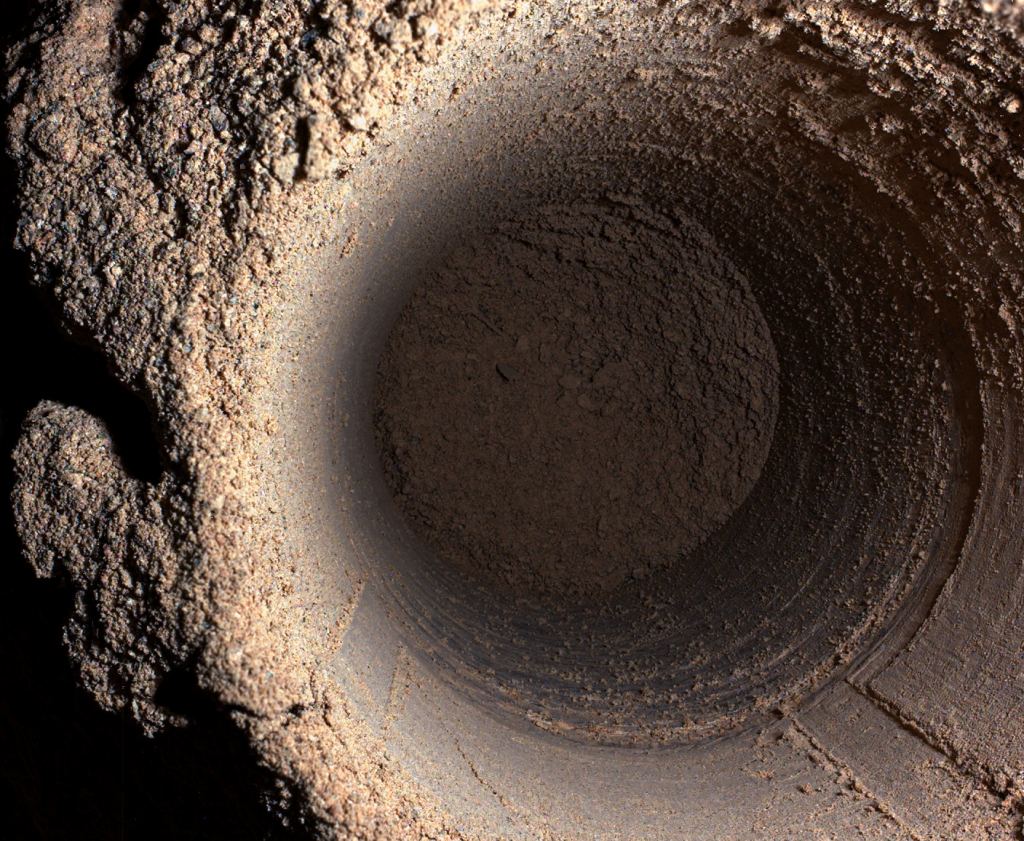Here’s one of the best views you’ll ever see of the insides of a rock on Mars. The hole was made by the Perseverance rover’s drill, a rotary percussive drill designed to extract rock core samples from the surface of Mars. After the sample was taken, Perseverance rover acquired this image using its SHERLOC WATSON camera to take a close-up view of the hole.
This is such a clear image because image editing expert Kevin Gill used a technique called focus merge to get the best view possible. A “focus merge” uses a series of images taken at different focuses, stacks them up and uses whichever pixels are the sharpest. You can see a larger version on Kevin’s Flickr page.
“Photoshop calls it ‘Auto Merge’,” Gill said on Twitter. “I’m not sure about Percy, but MSL [Curiosity rover] does this onboard the rover. I wrote my own algorithm and used that here.
” Mars Perseverance Sol 490 – Right Mastcam-Z Camera: The Swift Run core inside the coring bit. Credits: NASA/JPL-Caltech/ASU. Both the drill and the camera are located on the turret at the end of the rover’s robotic arm.
The core sample from the rock is about the size of a small pinky finger. This is the 10th core sample taken by Perseverance and the first sample from the rover’s current location, the Jezero delta. This region is especially interesting because it appears to be an ancient river delta, which might provide evidence of past life on Mars.
Since arriving at the delta, the rover has been observing and testing out various different rocks to see if they are good candidate for core samples in this area. The rover team said that the first few rocks that were considered either fractured too easily or had surfaces that were too rough to safely place the drill. They were looking specifically for a rock that was scientifically interesting, had a manageable amount of surface topography, large enough to fit an abrasion and two cores, and predicted to be robust to drilling.
Mars Perseverance Sol 490 – Left Navigation Camera: The abraded patch and coring borehole on the rock Skinner Ridge. Credits: NASA/JPL-Caltech The best candidate was this rock, which the team named Skinner Ridge. The first abrasion tests revealed the inner surface of the rock without fracturing the surrounding area.
The rover’s full instrument suite was used to investigate and document the abraded patch, then it was time to core. Iona Brockie, Sampling Engineer at NASA/JPL wrote on the Perseverance rover blog that collecting it went very smoothly. “At 6.
70 cm long, it is our longest core of the mission so far,” Brockie wrote. “Perhaps even more exciting was to see that those same clasts visible in the abraded patch were also visible in the core. ” This core sample is interesting enough that it might get a one-way ticket back to Earth in the future, with the proposed Mars sample return mission, which will bring back to Earth selected core samples that the rover has collected.
Per the rover team’s naming protocols, the Perseverance mission names areas after different national parks on Earth. Rocks, abrasions, and cores are given names related to the current area. The rover is currently in the Shenandoah quadrangle, named for the U.
S. National Park in Virginia. Skinner Ridge is a feature in Shenandoah.
The post A Look Inside One of Perseverance’s Core Holes appeared first on Universe Today. .
From: universetoday
URL: https://www.universetoday.com/156884/a-look-inside-one-of-perseverances-core-holes/



